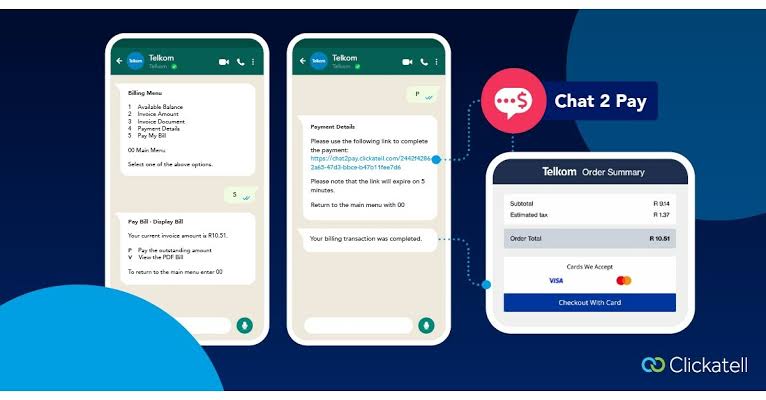Chat commerce, and corporate messaging pioneer Clickatell has introduced a Chat 2 Pay tool for Telkom, South Africa’s leading integrated communications provider. The capability would enable telco service users to generate and make payments via WhatsApp.
Telkom stated in a statement that the company introduced this provision in response to the growing need for digital, self-service choices that are quick and convenient. Consumers are encouraged to use the Chat 2 Pay pay-by-link tool in WhatsApp, which enables simple, secure, and hassle-free mobile payments.
Postpaid and prepaid clients can purchase airtime, internet and SMS bundles, and xDSL/fiber bills over WhatsApp by simply sending “Hello” to the number 0811601700.
Telkom’s chatbot upgrade
Customer mobile support has previously been provided by Telkom’s chatbot by gaining access to their accounts and billing data. Additionally, discounts are offered for views as well as for other services, including cancellations, directory inquiries, mobile or fiber upgrades, and more.
A simple and individualized service for bill payments and VAS top-ups using standard debit and credit cards issued by card issuers like Mastercard and Visa will be made available to users with the launch of the Chat 2 Pay feature.
Werner Lindemann, Clickatell’s senior vice president of enterprise sales and growth markets, said, “User behaviour has changed, and enterprises are embracing digital channels to earn cash.”
“Payments in chat give telcos the tools to assist their consumers’ complete payments simply and safely using the channel they already trust, greatly enhancing the customer experience and revenue.”
How to use Telkom’s chat-to-pay feature on WhatsApp
Telkom customers can transact by choosing a menu option to create a payment request, following which a link is delivered to the customer via WhatsApp. The URL is clickable, though, and a hosted checkout page becomes available.
After securely entering payment information, the user can submit the information, and the chat message is then confirmed as having been received.
Gugu Mthembu, Telkom’s CMO, stated that the company “continues to look at methods to advance our customers’ digital experiences” and that “our digital channels are fundamental for future delivery.”
“Chat 2 Pay facilitates the optimization of our payment channels and payment collection. “Moreover, the convenience and accessibility of VAS services are anticipated to increase revenue prospects.”
Clickatell’s Chat Commerce Platform sees 93% of discussions that start there conclude in a purchase, making Chat Commerce and its payment extension, Chat 2 Pay, highly relevant for telcos seeking new income streams and operational efficiencies. Lindemann argued that Chat Commerce not only satisfies the demands of clients but also those of the company’s shareholders.
More on Clickatell and Telkom
The Clickatell Chat Commerce Platform facilitates the growth of messaging, engagement, and monetary solutions based on chat interactions with customers. Each month, our international clientele effortlessly handles millions of chat-based transactions and chats. Clickatell is fueling the shift to cashless, cashless, in-person, and app-less commerce.
With the use of technology, we improve life for people all over the world by facilitating online trade through conversation. Customers may now text or chat with companies to learn about products, place orders, check shipment status, and get answers to questions.
Telkom SA SOC Limited, based in South Africa, provides landline and wireless services to customers in more than 38 countries across Africa. The South African government owns 40.5% of Telkom, and the Public Investment Corporation (PIC), which is closely connected to the South African government, owns another 14.8%.




